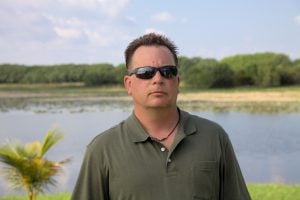Introducing Jim Cobb
Jim Cobb has been an active prepper for over 30 years. He’s a prolific writer, having written Prepper’s Long-Term Survival 
Jim’s Early Start and Biggest Lesson
Bob: In the introduction of Prepper’s Long-Term Survival Guide, you mentioned that Jerry Ahern’s The Survivalist and Bruce D. Clayton’s Life After Doomsday led you on a journey to become truly prepared for life without the comforts we take for granted. What other influences, if any, pushed you to get into prepping?
Jim: To me, it has always just seemed like common sense to want to be prepared for life’s little, and not so little, curve balls. Since I was young, I’ve always been drawn to end of the world novels and they would naturally get me thinking about how I would handle the various situations in the books. Later, as I got more involved with writing and speaking about preparedness, the more contact I had with folks yearning to learn more pushed me to study more myself so I could share the knowledge with others.
Bob: You’re a voracious reader and a student of history. What key lessons do you think we can learn from the past to better prepare ourselves for the various threats we see emerging on the horizon?
Jim: I think the biggest lesson we can learn from history is that we cannot rely on others coming to save us in the wake of a disaster. While help may indeed be on the way, we cannot control when it might arrive. We will have to make do with what we have until that time comes. So, it is incumbent upon us to make sure we will have what we need when we need it, whether we’re talking about stockpiled food or first aid skills.
Bob: An elite class of preppers is emerging. Luxury bunkers have been marketed to the wealthy and expensive methods of escape have been created. That said, everyone can prepare for a SHTF event. You wrote a book on home defense, so for those who intend to hunker down if SHTF, what would be your number one suggestion?
Jim: I’m a big proponent of dogs. Not necessarily “attack” or “guard” dogs, though, as the owner should be properly trained in how to handle those animals. What I suggest is investing in one or two mutts from the local animal shelter. They’ll love you for it and protect you as part of their pack. Dogs are great alerts for anything that might be amiss. They’ll cue in on things far earlier than you will. Of course, this is a lifetime commitment so I’d go another route if you’re not ready for that.
Bob: The advice you have published about over the years span across a number of areas: defense, home security, communication, finance, and more. Would you say one specific area is the most important to prepare against a SHTF moment? Why or why not?
Jim: Mental attitude is the most important prep someone can build on. Success begins between the ears. All the preps in the world won’t be of much use to someone who has convinced themselves that they’re going to die.
Bob: In his book The Fifth Risk, Michael Lewis discusses the many attempted and successful attacks on our nation’s electrical grid. You’ve also expressed unease about this vulnerability. What can we do to address this glaring issue?
Jim: First and foremost, we need to be upfront and honest about the very real possibility of hackers or others gaining control and shutting down parts of the grid. I think we sometimes have a tendency to look at risks like this with a, “that will never happen here” attitude, which is a mistake. Further, we need to work on improving the grid’s security, both physically as well as on the cyber end of things.
Mistakes, Motivation, and Feedback
Bob: You suggest in your books that prepping for short term disruptions is not nearly as important as developing the skills necessary to survive disasters like an EMP strike. What big mistakes do you see preppers making and what recommendations would you offer them to help them become better prepared?
Jim: One of the biggest mistakes I see is people trying to do too much too fast. As with anything else, prepping is far more effective if you start slow and work your way up. Learn to walk before you try sprinting. There’s a lot that falls under the preparedness umbrella and it is impossible to learn it all at the same time.
Bob: You’ve written numerous books, manage SurvivalWeekly.com, and have an active social media presence. What motivates you to so generously contribute content to the prepper community?
Jim: Don’t forget Prepper Survival Guide and Backwoods Survival Guide, LOL. I’m Editor in Chief for those magazines and I also provide a fair amount of the content for each of them. I enjoy the hell out of what I do and I’m very blessed to be able to earn a living doing what I love. I strongly believe in paying things forward. I received a lot of help from various people when I was starting out and I try to do that for others now.
Bob: I’m sure you’ve engaged with many of those whom have read your books, follow you on social media, and visit your website. What type of feedback have you gotten from these folks? Has anyone experienced a transformational success story you can share with us?
Jim: By and large, the feedback has been tremendously positive. I’ve had a few people contact me over the years, telling me they used this or that tip successfully.
Collaboration and Community
Bob: The prepper community is tight-knit. I’m impressed by the exchange of ideas and willingness to help one another. Which preppers do you work with today, or collaborate with on an ongoing basis?
Jim: One of my favorite human beings on the planet is Craig Caudill (NatureReliance.org). He is exceptionally knowledgeable, very humble, and is as eager as I am about sharing great information with people. We’ve collaborated on a few things and we chat a couple of times a week about various projects. Another colleague who I am very close with is John McCann (SurvivalResources.com). John is one of the most well-respected members of the “survival community” and is known for his knowledge, his integrity, and his no-nonsense attitude. I was a huge fan of his books long before I ever got to know him personally. We’ve grown to be great friends and he’s been an awesome sounding board for me on various things over the years.
Bob: How can people stay up to date with your social media posts?
Jim: I’m most active on Facebook — https://www.facebook.com/jimcobbsurvival. You can also keep up to date on the magazines I’m putting out with Centennial Media here –> https://www.facebook.com/prepsurvguide.
Bob: I really enjoyed speaking with you, Jim. You’re an inspiration to those in the prepper community. Thanks for your time.
Jim: I appreciate you reaching out to me. Happy to help in any way I can. Thanks!
Like the interview? Want to read similar interview transcripts? Leave a comment or contact me directly.




